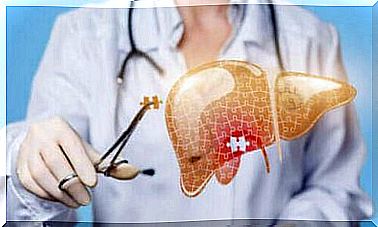4 Important Facts About Depression That All Women Should Know About

In our daily lives , it has become almost common to talk about depression. We discuss it easily and at times without knowing as much as we should on the subject. In this article, we take a look at some important facts about depression that you should know in order to evaluate your own mental health.
4 important facts about depression
First, people often forget that there are many different forms of depression. In fact, each person experiences it in a unique and unique way.
The first thing we should be aware of when facing or talking about depression is that we are dealing with a serious condition. It’s not a personal invention. Thus, we should never think of it as something that reflects a weak personality or lack of personal integrity or courage.
But one fact that you may not have been aware of is that although both men and women often suffer from depression, they often experience it in very different ways.
Men are generally reluctant to seek help. This is due to a number of social norms and pressures.
It is not always easy to put your finger on a general feeling of inner malaise, apathy or inability to enjoy activities that you normally enjoy. Which are all common symptoms of depression. Sometimes the clearest sign can be something as simple as an unexplained loss of energy.
The most common reaction reported among men in the beginning of a depressive state is to try to wave goodbye to the problem. Thus, many hope that it is only a difficult situation that will eventually disappear by itself.
Women, on the other hand, tend to have more tools to deal with and control how they feel. This is probably because women are most often socialized to communicate and vent their emotions.
Despite this, it is women who generally have a greater tendency to develop depressive disorders.
Today we want to take the time to dive deeper into this last aspect. Below we will talk about nuances that define how depression particularly affects women.
1. Facts about depression: Depression as a genetic trait: A risk factor, not a determining factor

According to Dr. Fumiko Hoeft of the University of California, USA, allows mothers to pass on a specific genetic predisposition to depression in their daughters.
Specifically, what is passed on through the generations is a similar brain structure. This part of the brain’s cortico-limbic system – the part responsible for controlling our response to stress – shares similar architecture and patterns with internal connections.
But the fact that a woman suffers from or has suffered a depression in the past does not mean that her daughter or daughters will inevitably suffer from the same condition at some point in their lives.
- Scientific studies show that there is a greater risk or at least a greater probability.
- However , this genetic risk must be considered along with other variables that carry greater weight. These include the individual’s social environment and how they deal with different experiences – good and bad – that they encounter during their lives.
2. Facts about depression: Depression “hurts” – and the pain is real

Why do we suffer from unexplained headaches?
When a woman suffers from depression, it is unfortunately common for the people around us – and society as a whole – to simply label it as the feeling of “sadness”.
A feeling of sadness can be a very real part of depression. However, it is important to be aware that this emotional state occupies only a small part within the range of emotions that can be experienced during depressive states.
In fact, there are times when the person with depression does not even feel sad. In fact, she may feel angry, upset, without control over her emotions… The list goes on.
In fact, the most common symptom of depression in women is not grief. In fact, it is often no emotion – it is physical.
Let’s take a closer look at some of the classic symptoms:
- Insomnia
- Extreme exhaustion
- Muscle pain
- Headache
- Greater sensitivity to physical pain
- Problems with digestion
- Small memory loss
- Sudden weight gain or loss
3. Facts About Depression: Certain types of depression that are unique to women

In addition, there are certain types of depression that are experienced only by women. But as we pointed out at the beginning, every woman will also experience these more specific types of depression in a unique way.
Here are some types of depression that are unique to women:
Premenstrual Dysphoric Disorder (PMDD)
Most people are familiar with the term “premenstrual syndrome.” It comes with the classic mood swings and irritation that tend to occur in the few days leading up to menstruation.
- However, there is a more serious form of premenstrual syndrome called premenstrual dysphoric disorder (PMDD).
- Unfortunately, it can come with suicidal thoughts and intense pain in joints and muscles.
Postpartum depression
Postpartum depression, sometimes called “postpartum depression”, remains a taboo subject among many women. However, it is very common.
Motherhood is associated with intense happiness and personal fulfillment. Therefore, there is still stigma around postpartum depression, which can make patients feel even more misunderstood or even rejected.
Postpartum depression is typically accompanied by anxiety and extreme exhaustion. Plus, it comes with a sense of not being able to cope with the enormous responsibilities that come with new mothers.
Pre-menopausal depression
Pre-menopause (or menopause) is a normal phase in a woman’s life. However, it can sometimes be very challenging.
Mood swings, hot flashes, periods of irritability, anxiety and the feeling that we can no longer enjoy anything are far from unusual in this time.
Thus, the risk of developing other forms of depression increases during the transition to menopause.
4. Facts about depression: Our personal and social environment plays a role

Everyone – both men and women – needs a strong support network. We all need understanding from those around us to help us deal with and cope with the symptoms of depression.
But the biggest problem many women encounter when struggling with depression is that there are many other people who are addicted to them.
A disproportionate number of women are in the role of caregivers. Often, they support family members who are financially dependent on them or suffering from other illnesses.
Others have the sole responsibility for caring for children, and consider themselves the glue that holds their families together. A common fear is that if they “fail,” the family will fall apart and the harmony they strive to achieve will be lost.
Personal circumstances like these can make it very difficult for women to get the support they need. It is often difficult for them to take time for themselves to acknowledge the problem and seek treatment, whether it is about going to therapy or simply dealing with their internal struggle.
Therefore, it is very common for women to simply tell themselves that “pills are enough.”
But we need to make it clear: The pills we take to manage the pain in life – whether it is physical or emotional – then it will never be enough in itself. But we must also consider other strategies. Part of that must be to make sure we have a sensitive and close support network.
Depression in women, as we have seen, comes with a number of very special characteristics that we should take into consideration in our daily lives. It is important whether we deal with it directly or try to ensure that we can help, comfort and support those affected.
How many of these facts about depression were new to you?









